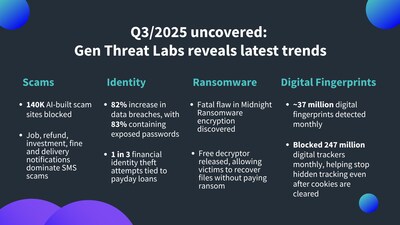Trust is Under Attack: AI and Automation Fuel a New Wave of Targeted Cybercrime
Rhea-AI Summary
Gen (NASDAQ: GEN) released its Q3 2025 Gen Threat Report for July–September, showing rapid escalation in AI‑driven cybercrime.
Key findings: 140,000 AI‑generated phishing sites blocked since January 2025; an 82% quarter‑over‑quarter increase in breach incidents; average 37 million device‑fingerprinting detections per month; and 247 million trackers blocked monthly. Gen also found AI‑written scam SMS campaigns concentrated into top lures (top five = 26% of malicious texts) and highlighted a free decryptor released for Midnight Ransomware victims. The report emphasizes growing personalization of attacks as criminals use AI to automate persuasion and harvest high‑value credentials.
Positive
- Blocked 140,000 AI‑generated phishing sites since January 2025
- Detected an average 37 million device‑fingerprinting attempts monthly
- Blocked 247 million trackers per month across telemetry
- Released a free Midnight Ransomware decryptor for victims
Negative
- Breach incidents rose 82% quarter‑over‑quarter
- 83% of breaches contained passwords, increasing account‑takeover risk
- Top five SMS campaigns accounted for 26% of malicious texts
- FTC reported $470 million losses from text scams in 2024
News Market Reaction
On the day this news was published, GEN declined 0.48%, reflecting a mild negative market reaction.
Data tracked by StockTitan Argus on the day of publication.
Gen finds AI-built phishing factories, rising text campaigns, data breaches and digital tracking define the Q3 cybercrime landscape
Gen recorded 140,000 AI-generated phishing sites, a surge in AI-created scam text message campaigns, and an
"AI has changed the scale and speed of cybercrime," said Siggi Stefnisson, Cyber Safety CTO at Gen. "It is being used to mass-produce scams, tailor ransomware, and target people with precision we have never seen before. Our mission is to stay one step ahead, using AI for protection rather than deception, and to bring real-time defense to every moment people live and work online."
AI-Powered Phishing Factories
One of the strongest trends this quarter was the rise of AI-built phishing sites that look and feel just like real brands. Gen threat researchers call these "VibeScams" because their success depends less on coding and more on convincing. With AI web builders, criminals can now create high-quality brand-look-a-like phishing sites in minutes instead of hours.
Since January 2025, Gen has blocked more than 140,000 of these AI-generated scam sites. Activity remained high in Q3, with
Data Breaches Shift to "Quality over Quantity"
Breach activity rose sharply, with breach events up
Identity misuse alerts from Gen telemetry reveal the same pattern. Payday loans accounted for
Text Scams Get Smarter
Text-based fraud continues to rise, driven by automation and AI-generated messages that seem increasingly authentic. Gen Threat Labs analyzed hundreds of millions of SMS messages this quarter and found recurring lure patterns designed to exploit urgency and routine. The vast majority were financially motivated, aiming to extract a small payment, capture card details, or take over accounts. The top five campaigns alone accounted for
According to the
Digital Fingerprints on the Rise
Even as consumers clear cookies and use privacy tools, digital tracking continues to evolve. Digital fingerprints are like a device's unique signature, a mix of settings and details that can identify someone online even without cookies. Gen's telemetry shows an average of 247 million trackers blocked each month and a steady 37 million digital fingerprints detected monthly. The Gen family of trusted Cyber Safety brands, such as Norton and Avast, helps protect consumer privacy from fingerprinting with products that spot these signals and block them or mask the information they seek. Discussions about encryption have resurfaced in the
Protecting Yourself and Your Business
The quarter also included a major win for people and small businesses. Gen researchers discovered a fatal flaw in the Midnight Ransomware encryption and released a free decryptor that allows victims to recover files without paying. The impact of ransomware can reach far beyond large organizations, as small businesses and individual consumers often face the greatest losses when critical systems or personal files are locked without backup.
Gen brands help protect people every day from falling victim to the scams highlighted in this report through solutions like Norton Scam Protection included as part of the Norton 360 lineup, and Scam Guardian, newly added scam protection included with Avast Free Antivirus and Avast Premium Security. For Identity Theft, LifeLock helps keep people covered in the event of a breach or data exposure.
To read the full Q3/2025 Gen Threat Report, visit https://www.gendigital.com/blog/insights/reports/threat-report-q3-2025
About Gen
Gen (NASDAQ: GEN) is a global company dedicated to powering Digital Freedom through its trusted consumer brands including Norton, Avast, LifeLock, MoneyLion and more. The Gen family of consumer brands is rooted in providing financial empowerment and cyber safety for the first digital generations. Today, Gen empowers people to live their digital lives safely, privately and confidently for generations to come. Gen brings award-winning products and services in cybersecurity, online privacy, identity protection and financial wellness to millions of people in more than 150 countries. Learn more at GenDigital.com.
About the Gen Threat Labs
Gen Threat Labs is the Cyber Safety research team within Gen, focused on uncovering and analyzing the latest digital threats and scams worldwide. Rooted in data, research, and technical expertise, the team identifies patterns and risks that shape the evolving cyber landscape. Their insights power the security technologies that protect people across Gen's portfolio of trusted brands, including Norton, Avast, LifeLock, and others.
Brittany Posey
Gen
Press@GenDigital.com
Courtney Rowles
Edelman for Gen
Courtney.Rowles@Edelman.com
![]() View original content to download multimedia:https://www.prnewswire.com/news-releases/trust-is-under-attack-ai-and-automation-fuel-a-new-wave-of-targeted-cybercrime-302596332.html
View original content to download multimedia:https://www.prnewswire.com/news-releases/trust-is-under-attack-ai-and-automation-fuel-a-new-wave-of-targeted-cybercrime-302596332.html
SOURCE Gen Digital Inc.









